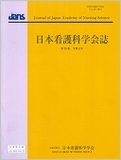Japanese
English
- 販売していません
- Abstract 文献概要
- 参考文献 Reference
要旨
目的:妻子が自主避難した経験を持つ男性労働者(以下,避難実施群とする)の経験を明らかにする.
方法:福島県内の32企業に勤務する2,209人の男性労働者に無記名自記式質問紙調査を行った.
結果:分析対象者352人(有効回答率16.0%)のうち避難実施群は80人(22.7%)で,8割以上が放射線の子どもへの健康影響を心配し自主避難させていた.またその61.3%が妻子を自主避難させたことを「良かった」と評価していた.「良くなかった」と評価したことには「放射線に関して公開される情報が信頼できないから」,「家事を自力でやらなければならなかった」,「妻子が自主避難していることを誰にも相談できなかった」と回答したことが有意に関連していた.
結論:妻子の自主避難に対する評価が低かった者は,災害時のリスクコミュニケーションに課題を感じており,家事負担の増加や社会的孤立を経験していた可能性が示唆された.
Objectives: The purpose of this study was to explore the experiences of male workers whose wife and children voluntarily evacuated after the Fukushima nuclear power plant disaster (implementation group).
Methods: The sample was 2,209 male workers working for 32 companies of the Fukushima Prefecture. We sent an anonymous self-administered questionnaire to them.
Results: Among the 352 men (response rate: 16.0%), 80 (22.7%) were in the implementation group. Among the implementation group, more than 80% were concerned about the effect of radiation on their children. Additionally, 61.3% of the implementation group evaluated the evacuation of the wife and child as “good”. On the contrary, the evaluation of it as “not good” was significantly associated with “I could not trust the information released about radiation”, “I had to do housework by myself”, and “I could talk to nobody that my wife and children evacuating voluntarily”.
Conclusion: The results suggested that the person with low evaluation of voluntarily evacuation of their wife and children would feel that there was a problem in risk communication during disasters, and might have experienced increased household burden and social isolation.
Copyright © 2019, Japan Academy of Nursing Science. All rights reserved.


